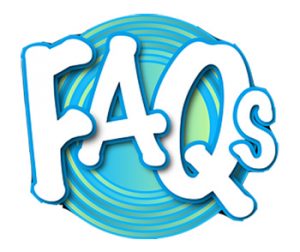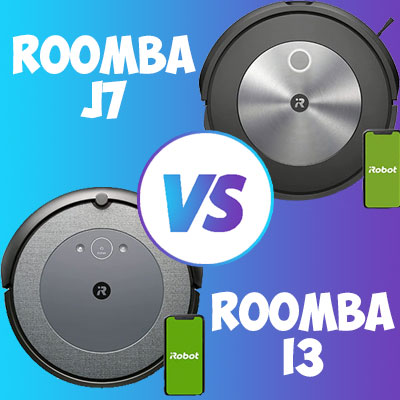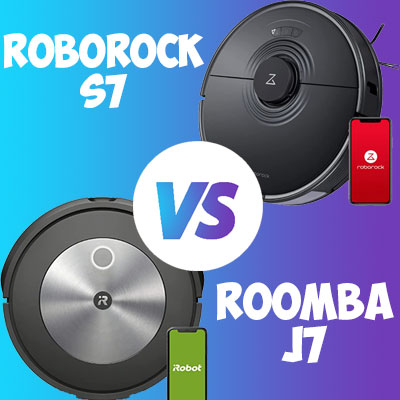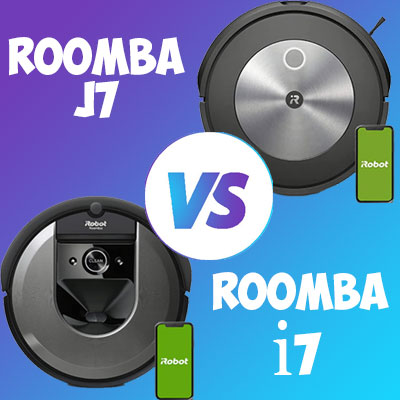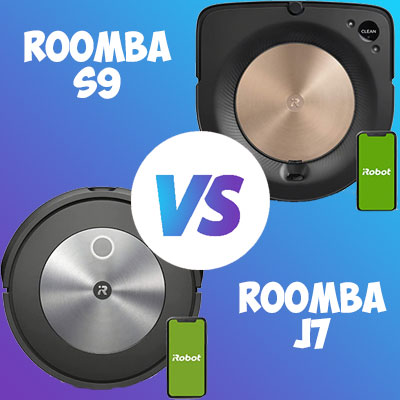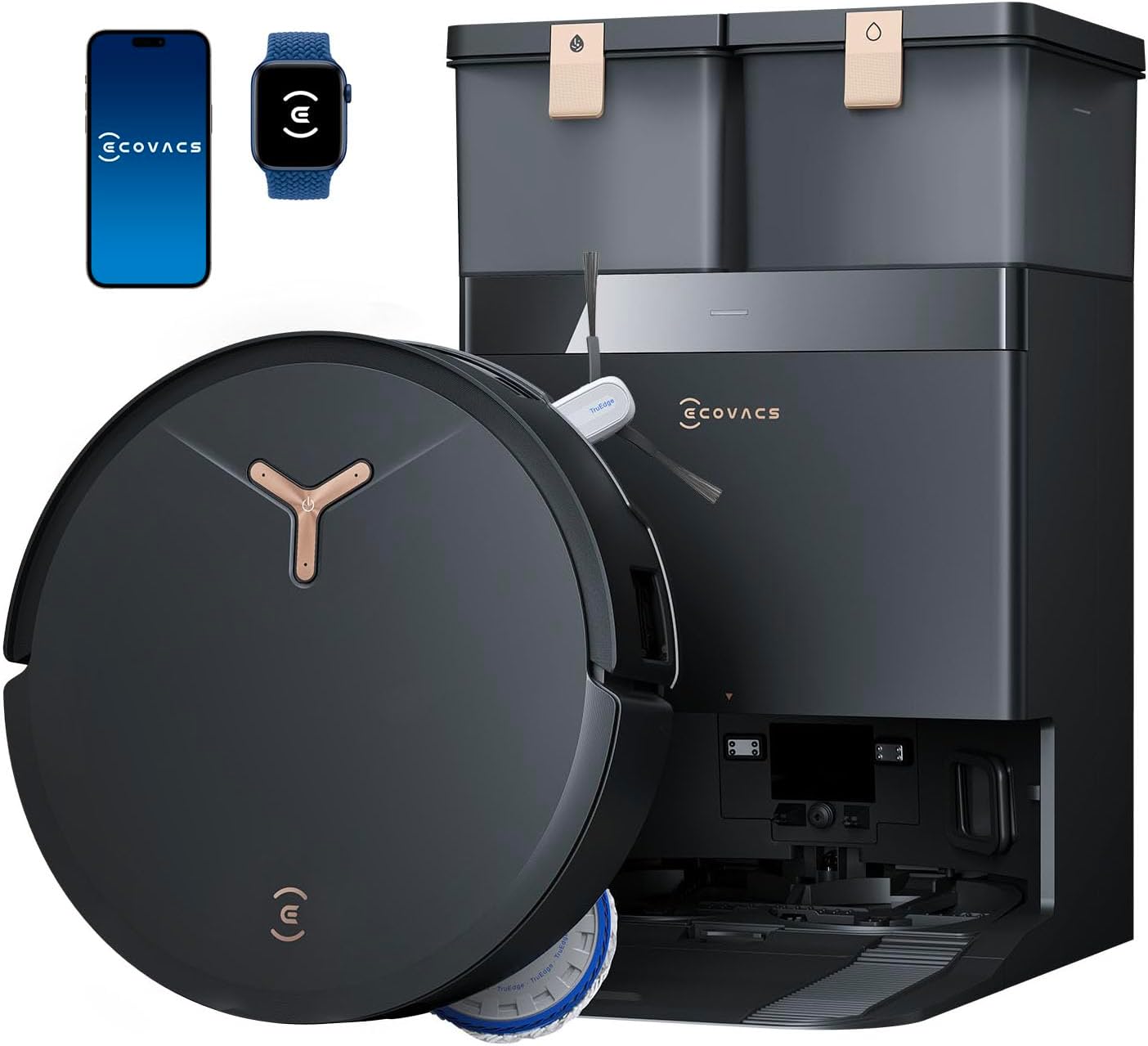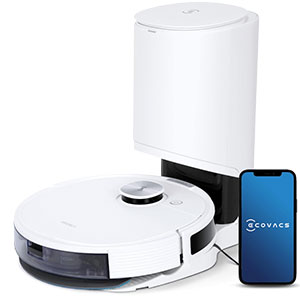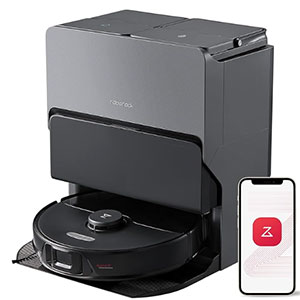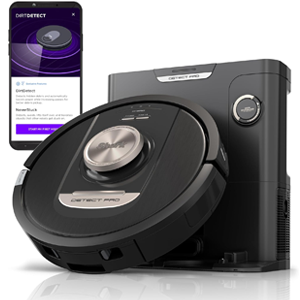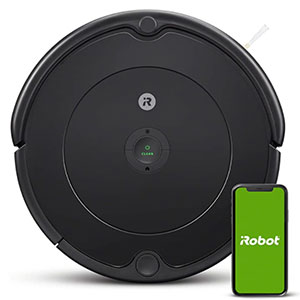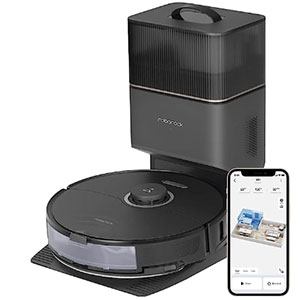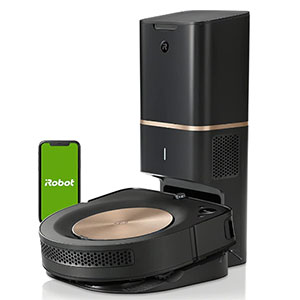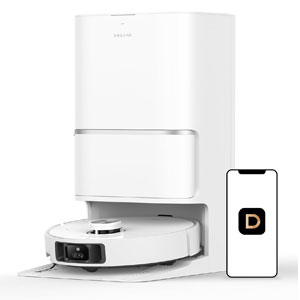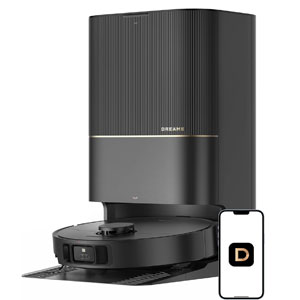Roomba J7 vs. Roborock S6 MaxV
Roomba J7
Roborock S6 MaxV
Roomba J7
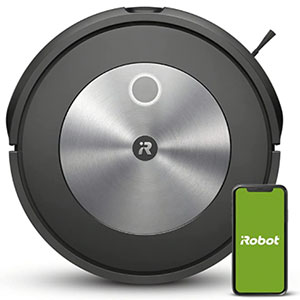
- Dimensions 13.34 x 13.3 x 3.4 inches
- Weight 7.5 pounds
- Suction Power 1700 Pa
- Navigation PrecisionVision Navigation
- Multi-Floor Mapping yes
- Camera yes
- Filter HEPA-style
- Dustbin 300 ml
- Mopping no
- Auto Dirt Disposal yes
- Runtime 100 minutes
- WiFi Connectivity yes

Roborock S6 MaxV
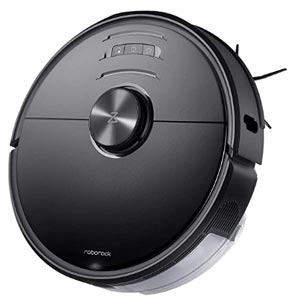
- Dimensions 13.8" x 13.8" x 4.5"
- Weight 12.1 pounds
- Suction Power 2500 Pa
- Navigation Precision LiDAR Navigation
- Multi-Floor Mapping yes
- Camera twin stereoscopic cameras
- Filter HEPA-style
- Dustbin 460 ml
- Mopping yes
- Auto Dirt Disposal yes
- Runtime 180 minutes
- WiFi Connectivity yes
This Roomba J7 vs. Roborock S6 MaxV comparison review is suitable for shoppers who are not sure which is the best mid-budget robot vacuum to buy in 2022.
Roomba and Roborock are two of the best robot vacuum brands today, with the models mentioned above as the best for mid-budget buyers. While they share a lot of features, there are clear-cut differences that set the two models apart. So, what’s the main difference between Roomba J7 and Roborock 6 MaxV?
Roomba J7 is a smart robot vacuum with automatic self-emptying. It’s best for vacuuming bare floors and pet hair. It doesn’t have a mopping function but can sync with the Braava M6 for simultaneous vacuuming and mopping. On the other hand, the S6 MaxV is a 2-in-1 robot vacuum that vacuums and mops simultaneously. It also boasts higher suction and longer runtime.
Roomba J7 vs. Roborock S6 MaxV Face to Face Comparison Review
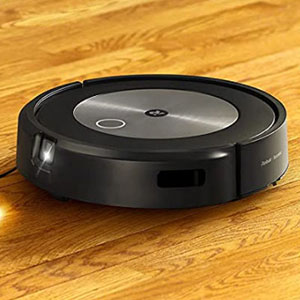
The Roomba J7 may not be the thinnest robot vacuum around, but it maintains a low-profile round shape design to allow it to go under low-profile furniture.
Regarding the dimensions and weight, Roomba J7 is 13.3 inches (width) x 3.4 inches (height) and just 7.49lbs. As for the aesthetics, the J7 is available in a single color, silver/black.
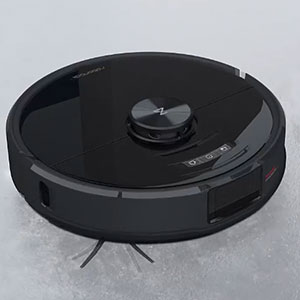
Roborock S6 MaxV also features a low-profile round shape design, but it’s slightly thicker and heavier. But it still does creep under many low-profile furniture unrestricted.
As for dimensions and weight, the S6 MaxV measures 13.8 inches (width) x 3.79 inches (height) and weighs 8.16 lbs. It’s also available in a single finish, all black.
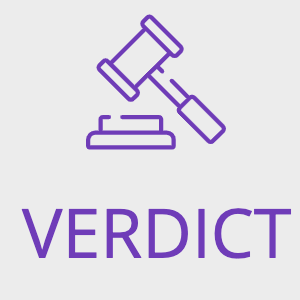

Both Roomba J7 and S6 MaxV have a low-profile design and are appealing. However, Roomba J7 is the best as it's slimmer. On the other hand, the aesthetic appeal of the S6 MaxV might make you think twice.
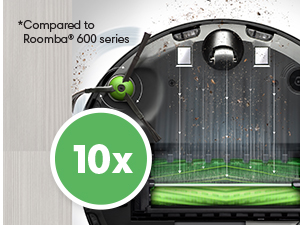
Despite being a pretty new addition to the Roomba lineup, the J7 puts up average suction power, so it’s not the best robot vacuum for carpets.
Featuring the same 2nd Gen motor equipped in the Roomba 800 and 960 series, it delivers 10x the airpower of the 600 series. On average, the J7 delivers 900pa and has a single speed – there’s no low or high power mode.
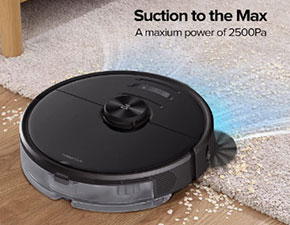
One of the strengths of the S6 MaxV is the upgraded HyperForce motor. While the predecessor puts up 2000pa, the S6 MaxV is a 2500pa HyperForceTM stormer.
This gives it the ability to capture all kinds of dirt, from fine dust to large debris. Besides, the motor is multispeed, so you can adjust suction. There are five suction modes: Balanced, Gentle, Quiet, Turbo, and Max.


Roborock beats iRobot in terms of suction as the S6 MaxV is almost three times stronger. What's more? The suction can be adjusted depending on the cleaning needs.
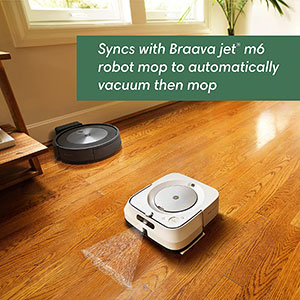
As mentioned earlier, the Roomba J7 doesn’t have a mopping function – it vacuums only. So you will need a separate robot mop to get the job done. The best option is the Braava M6, designed to sync with the J7.
This is courtesy of Imprint Link Technology, a home automation innovation that tells the M6 to start mopping once the J7 or any other compatible Roomba has finished vacuuming.
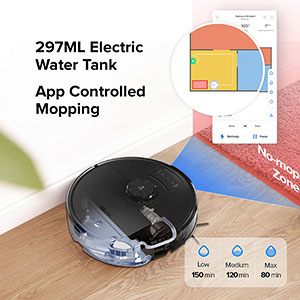
The S6 MaxV boasts Genius Level Mopping capabilities, thanks to the revolutionary SnapMopTM system. It consists of a 297Ml electronic water tank that holds enough water to mop an average of 200sqm (2150sqft).
With the S6 MaxV, you can control the water dispensation from the app and tailor water flow depending on the room. This robot vacuum also comes with No-Mop Zones to keep carpets dry.


In this round, too, Roomba loses now that with iRobot, you will have to invest in a robot mop which is costly. But robot rock integrates a mop at a friendly price.
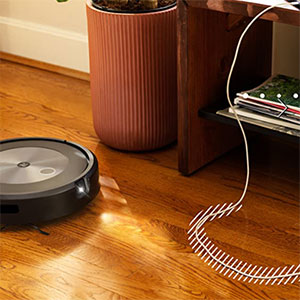
One of the best features of the Roomba J7 is the iAdapt 3.0 Navigation with PrecisionVision technology, a technology based on a vSLAM architecture. There is a set of sensors for localization alongside obstacle and cliff sensors for preventing accidents. This system is very accurate in high-traffic rooms.
PrecisionVision Navigation, in particular, helps the robot to identify common household obstacles, from dog poop to shoes and socks. The sensors are assisted by a real-time camera pointed to the ceiling.
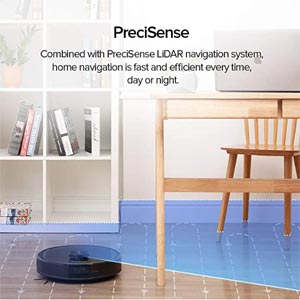
The Roborock S6 MaxV is quite similar to the Roomba J7 in terms of navigation. It also features a vSLAM-based navigation system dubbed PreciSense LiDAR Navigation and proprietary ReactiveAI obstacle avoidance. It consists of obstacle and cliff detection sensors and a retractable bumper.
This is alongside two cameras, but this time, front-facing cameras, unlike Roomba’s that point to the ceiling. Roborock also has an intelligent system that enables it to identify obstacles. This is courtesy of the Qualcomm® APQ8053 processor chip and the fact that the S6 MaxV is trained on tens of thousands of real-world images.


It's quite hard to call a winner here as these two robot vacuums excel when it comes to navigation. They both have vSLAM navigation systems and extras that allow them to recognize obstacles and maneuver with human-like precision. However, Roomba's P.O.O.P. (Pet Owner Official Promise) is something that should change your mind.
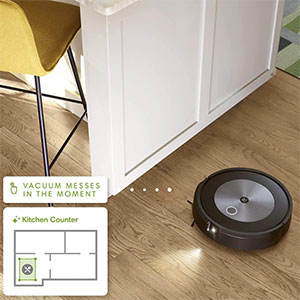
Roomba J7 is powered by Imprint Smart Mapping, the new feature in iAdapt 3.0. Imprint Smart Mapping is an intelligent floor scanning and mapping system that gives the J7 the ability to learn, map, and adapt to the plan of your house.
The J7 can create and save up to 10 maps, so it’s ideal for homes with multiple floors. When it comes to boundary marking, we are glad Roomba J7 has Keep Out Zones, allowing users to set boundaries right from the iRobot HOME app.
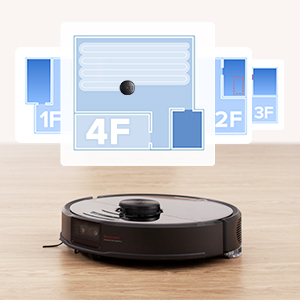
The Roborock S6 MaxV is also a smart robot vacuum with an intelligent floor scanning and mapping system. Powered by a Qualcomm® APQ8053 processor chip and PreciSense LiDAR and visual scene recognition, the S6 MaxV can create hyper-accurate maps of your home.
Besides, it can save up to 3 maps, so it’s also ideal for multilevel homes. Other noteworthy features include No Go Zones, No Mop Zones, and Invisible Walls.


Both the J7 and S6 MaxV have intelligent floor mapping systems and offer just the same level of accuracy. However, the Roomba J7 is the best deal as it can save up to 10 maps while the S6 MaxV can save just 3.
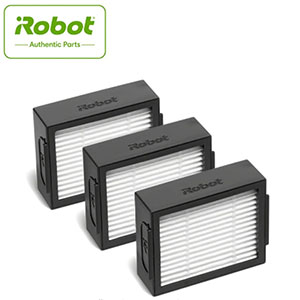
The Roomba J7 doesn’t come with true-HEPA filters. Instead, iRobot used AeroForce high-efficiency filters that can capture 99% of allergens.
Unfortunately, they are not the best for allergy sufferers as they can’t capture down to 0.3 microns like true-HEPA filters. So the smallest particles will still linger around.
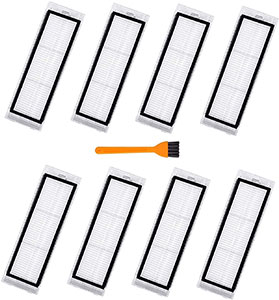
The S6 Max V is not better. As a matter of fact, it performs dismally compared to Roomba.
Roborock included washable E11-rated filters which capture 95% of allergens. So if you have allergies, you might want to think twice here.


While none of the two robot vacuums come with a true-HEPA filter, Roomba sounds like a better deal as its filters can capture 99% of allergens while Roborock captures 95%.
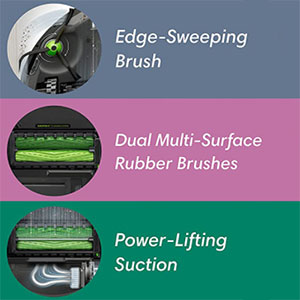
Roomba J7 comes with two sets of brushes. There is the patented AeroForce Dual Multi-Surface Rubber Brush that flexes to adjust to different floor types. As the name suggests, there are two brushes, one for agitating dirt and another for lifting agitated dirt.
This primary brushroll is assisted by a single side sweeping brush that reaches the corners and wall edges, directing dirt to the main brushroll for agitation. This brush is superb as it doesn’t get tangled easily, even when dealing with long pet hair.
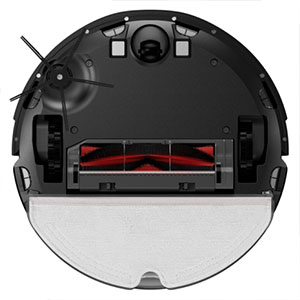
The Roborock S6 MaxV also comes with two sets of brushes. There is a spiral main brush with dense bristles that agitate all kinds of dirt, including stuck-on dirt.
Unfortunately, it gets tangled easily when picking up long pet hair. Besides the main brush, the Roborock S6 MaxV also comes with a single-side sweeping brush that gets to the deep corners and sweeps wall edges for detailed vacuuming.


Here, Roomba J7's AeroForce Dual Multi-Surface Rubber Brush takes the crown. This highly specialized brush tackles dirt on all kinds of surfaces and will hardly get tangled like the Roborock S6 Max V.
The Roomba J7 is one of the best affordable robot vacuums with automatic self-emptying. It comes with a 0.5L bin and is compatible with automatic self-emptying.
However, the Clean Base® Automatic Dirt Disposal unit is not included but can be bought separately. Only the J7+ comes with the Clean Base® Automatic Dirt Disposal unit. With the Roomba J7+, you can forgo bin emptying chores for an entire month.
The Roborock S6 MaxV is a great robot vacuum but unfortunately. It doesn’t support automatic self-emptying. The large 0.48L bin has to be emptied manually after each cleaning session.
Going for days without emptying the bin leads to a bad odor, especially if you have pets.


The Roomba J7 is the best choice here. While it doesn't include the automatic self-emptying station, it is compatible with the technology.
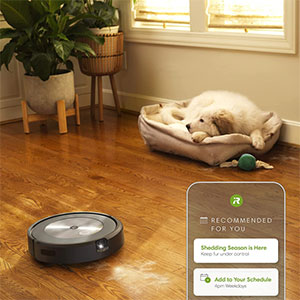
Roomba J7 is a smart robot vacuum powered by 2.4Ghz WiFi compatibility. The robot supports remote operation via the iRobot HOME app.
You need to connect it to your home WiFi, download the HOME app, and sync the two devices. You can schedule cleaning sessions on the app, start cleaning, name and rename rooms, set boundaries, view cleaning reports, and more.
Besides app operation, the J7 can sync with voice assistants, including Alexa and Google Assistant. Another great feature worth mentioning is iRobot Genius 3.0, which offers new levels of intelligence, personalization, and control.
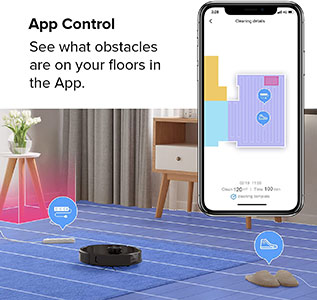
Just like the Roomba J7, the Roborock S6 MaxV is also a smart home-ready robot vacuum. It is compatible with 2.4GHz WiFi for smartphone app operation – Roborock HOME app.
On the app, users can set cleaning schedules, start cleaning sessions, name and rename rooms, set No Go Zones, set No Mop Zones, set Invisible Walls, control water flow, etc.
The S6 MaxV can also sync with voice assistants.


As far as automation is concerned, the two robot vacuums are the same as they are all compatible with WiFi and sync with other smart devices. However, the Roomba J7 wins the battle courtesy of iRobot Genius 3.0 Home Intelligence.
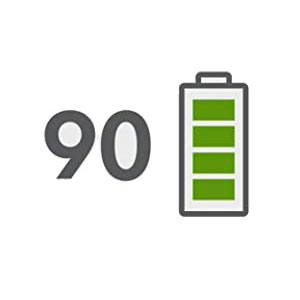
The Roomba J7 has been equipped with a Roomba® i8 Denali 2210mAh battery that offers a 90 minutes runtime when it’s new. Well, this is not so impressive, considering we have models that offer up to 200 minutes runtime.
All the same, it’s still worth the money now that the J7 can dock to recharge by itself and resume cleaning automatically. The average recharge time of the J7 is 2-3 hours.
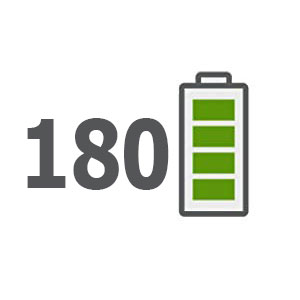
On the other hand, the Roborock S6 MaxV, just like the other models, tags along with a 5200mAh rechargeable lithium-ion battery. It offers 180 minutes runtime in low power mode, making it one of the best robot vacuums for large apartments.
Besides the longer runtime, the S6 MaxV can recharge and resume cleaning automatically. Interestingly, there is a quick charge feature (Top-Up Charge) that enables the robot to complete cleaning tasks instead of waiting for the entire 3 hours of recharge time.
The Roomba J7 comes with:
- 1 Roomba® j7 Robot Vacuum
- 1 Home Base® Charging Station
- 1 Extra High-Efficiency Filter
- 1 Extra Corner Brush (black)
Note: The Roomba J7+ comes with extra accessories: a Clean Base® Automatic Dirt Disposal unit and 2 Dirt Disposal Bags.
On the other hand, the Roborock S6 MaxV comes with:
- 1 Roborock S6 MaxV Robot Vacuum
- 1 Dock Charger
- 2 Washable Filters
- 1 Cleaning tool
- Artificial poop (for obstacle detection test)


Here, it's hard to call a winner. The Roborock S6 MaxV is a great choice as it comes with mopping accessories. However, you'd want to lean on the Roomba J7 as the ceiling model comes with accessories for automatic bin emptying.
Cleaning Test: Bare floors
We tested the vacuuming performance of these two robot vacuums on bare floors and carpets. Below are the results.
- Pet Hair
- 98
- 97
- Flour
- 95
- 99
- Sugar
- 96
- 99
- Ising sugar
- 96
- 99
- Cereals
- 97
- 99
- Rice
- 97
- 99
- Saw dust
- 97
- 99
- Kitty litter
- 94
- 98
Cleaning Test: Carpets
- Pet hair
- 95
- 97
- Flour
- 90
- 97
- Sugar
- 92
- 97
- Ising sugar
- 91
- 97
- Cereals
- 95
- 97
- Rice
- 95
- 97
- Saw dust
- 94
- 97
- Kitty litter
- 92
- 96
Maintenance
Lift the Roomba upside down and inspect whether there are tangles and stuck on dirt on the brush. If there’s anything that can jam the brush, it needs to be removed.
First, detach the brush and clear all dirt. Then, rotate the side sweeping brush to ensure it rotates smoothly. Remove any dirt if necessary. Replace brushes after 8-12 months, depending on wear and tear.
Lift the Roborock S6 MaxV and inspect the brush. Make sure there is no dirt or anything that might hinder its performance. If there are tangles and stuck-on dirt, detach the brush and remove the dirt.
As for the side sweeping brush, also check whether there are tangles. Replace Roborock’s brush after 12 months.
Clean filter at least once a month. Remove it and tap it in the garbage can to remove excess dust. Then, wash it and rinse in cold water. Leave it to dry and return it. Replace the filter after 6-8 months.
The Roborock’s filter should also be cleaned at least once a month. Here again, remove the filter, and tap it in the bin to remove excess dirt and dust. Then, wash, dry it and return. Replace the filter after 8 months.
For the Roomba J7, you have to empty it manually after each cleaning session. However, if you have the J7+, all you need to do is remove and dispose of the bag when it’s full. On average, it holds up to 30 days of dirt.
The S6 MaxV doesn’t come with automatic self-emptying, so you will have to eject and empty the bin, preferably daily, to prevent the buildup of bad odor.



